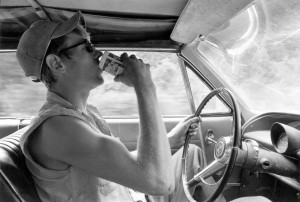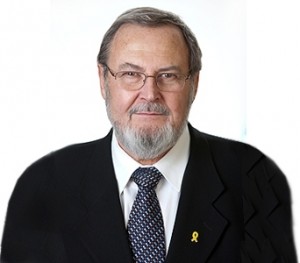Bar owners fear Bill 26 – but the ‘damage’ has already been done
Posted on December 6, 2011 By Mike Ross Culture, Front Slider
 It’s hard to believe, but driving drunk wasn’t always considered such a heinous offense against humanity.
It’s hard to believe, but driving drunk wasn’t always considered such a heinous offense against humanity.
As Alberta legislators continue to debate tough the new drunk driving sanctions in Bill 26 – which some members of the hospitality industry are opposing because they think it might hurt the hospitality industry – it might be helpful to remember what it was like in the “good old days.”
The ‘70s was a golden age for the Edmonton’s bar scene. The drinking age had been lowered from 21 to 18 in 1971 and it was a free-for-all. If you were there you might remember it. Or maybe not. There were live bands in dozens of venues six nights a week, cheap booze was flowing and plenty of consequence-free fun was to be had. A lot of guys (and girls) didn’t think twice about driving drunk. Cops often looked the other way as long as there wasn’t an accident: “Sir, just make sure you drive straight home and get some sleep. Have a good night now.”
That was a real cop quote, by the way, delivered to a real drunk dad behind the wheel. This reporter is lucky to be alive.
To imagine such an exchange happening today would fill most rational citizens with disgust. The fatalities piled up, the studies came in, the insurance industry had a fit and groups such as MADD (Mothers Against Drunk Driving) spread their message with a vengeance, and in no time flat, the bleedingly obvious was finally accepted en masse: Drunk drivers kill.
The paradigm shifted so swiftly it made your head spin. While “Driving While Intoxicated” has been an offense in Alberta since 1921, it took until 1985 for it to be transformed into a crime on par with murder. A new offense was added to the Criminal Code, among other sanctions: Impaired Driving Causing Death, with a maximum 14 years in prison. The minimum penalty for impaired driving was also raised from $50 to $300.
Alberta Transportation spokesperson Donna Babchishin says, “I remember how dramatic the change in attitude was. As appalling as it was under the conditions where we thought it was OK to drive, over years and education when we look back at that, we shake our heads.”
Yes, what we were thinking?
What happened to the bar scene around this time is well known in this town – it took a dive. Trudeau’s National Energy Program didn’t help the local economy, nor did the spread of AIDS in the early ‘80s help the singles bar scene, but the demonization of drunk driving amounted to a huge hit to the hospitality industry. Significant numbers of people simply stopped going out to the bars. They stayed home. They drank at home. They drank less when they went out. They didn’t drive drunk. And so the bars sold less booze. The industry has since adjusted, adapted, taken responsibility for their customers’ alcohol consumption as if they were children, but it has never recovered to the levels seen in the “boom” years.
So … if the “damage” has already been done, what are bar owners like Jesse Kupina complaining about?
The owner of the Union Hall and the Ranch Roadhouse recently sent a letter opposing Bill 26 to 20,000 people on the nightclubs’ subscriber list. He got one part flat-out wrong – opposing what he called a “reduction” of the legal blood-alcohol concentration limit from .08 to .05, when in fact it’s already an offense to blow over .05. The penalties that police give on the scene are what Bill 26 proposes to change. What was a mandatory 24-hour license suspension will become be a three-day suspension and vehicle seizure.
But Kupina hits the nerve of his industry’s jitters when he writes that the bill may “unfairly penalize law-abiding Albertans and does not sufficiently target the real issue: high risk and repeat drinking and driving offenders.” He adds, “Let’s go after the real drunk drivers.”
Alberta Transportation says it is. The proposed sanctions for over-the-limit and repeat offenders are even tougher under Bill 26, while the penalties for the 05-08 crowd amount to “prevention and early education,” Babchishin says.
Others say the real issue is lack of enforcement of the adequate laws we already have. Bring in more Check Stops. And pretty much everyone involved is looking to B.C., where similar legislation – which had been heralded as saving lives while at the same time adversely affecting the hospitality industry – was recently declared unconstitutional by a judge.
 Yet to see a judge is MP Peter Goldring, who resigned from the Tory caucus on Monday after being charged with refusing to submit to a breathalyser test over the weekend. Even the stigma of a potential drunk driving conviction these days can be devastating. Nice timing, Pete.
Yet to see a judge is MP Peter Goldring, who resigned from the Tory caucus on Monday after being charged with refusing to submit to a breathalyser test over the weekend. Even the stigma of a potential drunk driving conviction these days can be devastating. Nice timing, Pete.
What does MADD have to say about all this? Edmonton chapter president Leila Moulder says a lot of what’s been going around is “misinformation.”
She says, “Of course there’s going to be an adjustment period, but the catastrophic losses that people have predicted to happen haven’t happened in other provinces with similar legislation. For people who are the social drinkers, having a drink with dinner, you won’t fall under that category of blowing over .05.”
The real problem, according to one lawyer who specializes in defending accused drunk drivers, is the erosion of rights under the constitution. Calgary’s Bob Sawers says he finds the proposed roadside sanctions for drivers who blow over .08 particularly vexing – even though the police still have to have probable cause to demand a breath sample. One of the new instant penalties would be a license suspension until the case goes to trial, which can take months.
“The government isn’t enforcing the laws that already exist. They’re seeking the breach everyone’s rights, including the presumption of innocence until proven guilty,” Sawers says.
The bad old days are gone. If you’re a drunk driver today, you are a criminal and your own breath will convict you. As Sawers puts it, “Trial by machine.”
So where does this leave the Alberta hospitality industry? One possible unintended effect of Bill 26 is that people, in fearing the tough new roadside measures that amount to an instant drunk driving conviction, might not even bother to gauge how many drinks it takes to get to .05. They’ll just cab it all the time and wind up drinking more than ever.
Great. Now all we need are more taxis.











